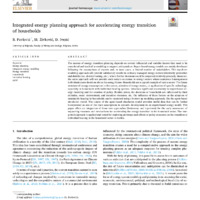Integrated energy planning approach for accelerating energy transition of households
Објеката
- Тип
- Рад у часопису
- Верзија рада
- објављена верзија
- Језик
- енглески
- Креатор
- Boban Pavlović, Marija Živković, Dejan Ivezić
- Извор
- Energy Reports
- Издавач
- Elsevier BV
- Датум издавања
- 2023
- Сажетак
- The success of energy transition planning depends on several influential and variable factors that need to be considered and tracked in modeling to support policymakers. Expert-based energy models are mainly developed following the assumptions of experts and, in most cases, a limited number of stakeholders. This top-down modeling approach will provide satisfactory results in centrally managed energy sectors (electricity generation and distribution, district heating, etc.), where further decisions could be projected relatively precisely. However, the same approach will not provide such certain outcomes in energy sectors where numerous heterogeneous individuals make decisions about the energy future. Households are a typical example of such a sector. The future structure of energy consumption in this sector, selection of energy source, or application of specific technology, especially in households with individual heating systems, introduce significant uncertainty in expert-based energy modeling and the creation of policy. Besides prices, the decisions of households are influenced by their attitudes, social environment, and incentive measures, etc. The influence of these factors on the adoption of sustainable heating by households can be examined using a bottom-up modeling approach, like the agent-based simulation model. The output of the agent-based simulation model provides useful data that can be further incorporated as one of the main assumptions in scenario development in an expert-based energy model. This paper offers an integration of these two approaches (bottom-up and top-down) for the early assessment of supporting measures and mechanisms for accelerating the energy transition in the household sector. The integrated approach is applied and tested for exploring pathways and effects of policy measures on the transition of individual heating in the household sector in Serbia.
- Број
- 10
- почетак странице
- 4641
- крај странице
- 4650
- doi
- 10.1016/j.egyr.2023.11.016
- issn
- 2352-4847
- Subject
- Energetsko planiranje, Integrisano energetsko modeliranje, Energetska tranzicija, Domaćinstva, Individualno grejanje, LEAP
- Energy planning, Integrated energy modeling, Energy transition, Households, Individual heating, LEAP
- Шира категорија рада
- M20
- Ужа категорија рада
- М22
- Права
- Отворени приступ
- Лиценца
- Creative Commons – Attribution-NonComercial 4.0 International
- Формат
- Медија
 Energy Reports 2023.pdf
Energy Reports 2023.pdf
Boban Pavlović, Marija Živković, Dejan Ivezić. "Integrated energy planning approach for accelerating energy transition of households" in Energy Reports, Elsevier BV (2023). https://doi.org/10.1016/j.egyr.2023.11.016 М22
This item was submitted on 23. новембар 2023. by [anonymous user] using the form “Рад у часопису” on the site “Радови”: http://romeka.rgf.rs/s/repo
Click here to view the collected data.